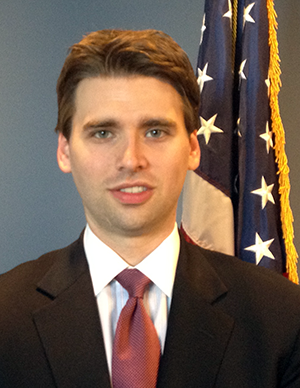John T. Kennedy, 28, Public Affairs
Here is John T. Kennedy’s favorite quote:
When nothing seems to help, I go look at a stonecutter hammering away at his rock, perhaps 100 times without as much as a crack showing in it. Yet at the hundred and first blow it will split in two, and I know it was not that blow that did it, but all that had gone before.
It’s attributed to the 19th-century journalist Jacob Riis, whom Kennedy learned about while studying urban planning. Riis, by Kennedy’s description, “worked to fight for a dignified existence for all urban dwellers.”
Kennedy, who is the White House Urban Affairs Advisor for the U.S. Department of Transportation, has worked in government at every level—local, regional, state, and federal. For the DOT, he writes analytical reports that present policies to congress and key people in the transportation sector. He also manages infrastructure grants, helps draft transit-themed legislation, and coordinates hill briefings.
(Photo: John T. Kennedy)

Before he moved to D.C., Kennedy was a transportation planner for the Capital Area Metropolitan Planning Organization in Austin, Texas, and a geospatial analyst for the Texas General Land Office. Before that, he earned four degrees from the University of Texas, including undergrad ones in government and journalism, and a master’s of public affairs.
Though he’s settled in D.C. now, Kennedy calls himself an “urban cowboy” and sees himself eventually moving back to the Lone Star state. “Addressing the challenges that Sun Belt cities face in adapting automobile-dependent transportation and land-use schemes to a more efficient and less clogged future should keep me busy for a few decades at least,” Kennedy says.
He’d love to create better options to connect Texas’ major cities to each other. “Eighty percent of the population of Texas resides in the triangle between San Antonio, Houston, and Dallas/Fort Worth,” Kennedy says. “Enhancing the mobility there could really make a difference in the quality of folks’ lives, with a ripple effect that benefits our entire nation.”
Kennedy, who grew up in San Antonio, has always been fascinated by the miracles of infrastructure, and by what he describes as “the eerie sense of concrete domination all around my suburban childhood.” But it wasn’t until graduate school that he found focus around his passion for understanding the relationships between land use, transportation, and economic development.
He spent 2012 at the White House, as an advisor for the Domestic Policy Council. Part of his job was to design and implement an initiative called Strong Cities, Strong Communities, to strengthen the governments of cities and towns. “It was truly inspirational,” he says, to work on an executive order that expands the bounds of local empowerment. “I had to pinch myself.”
Working for Polly Trottenberg, the DOT’s former undersecretary for policy—now New York City’s transportation commissioner—was “incredible,” Kennedy says. “She believed in giving young staffers a chance to shine and allowed me to seek formative leadership opportunities that would not have been available in a more traditional hierarchical setting.”
Good leadership is something Kennedy admires deeply. A hero of his is Greg Popovich, the coach of the San Antonio Spurs. “I would want to talk to Coach Pop about how he managed to build a total culture of excellence in his organization.” Kennedy says. “He has the ability to operate in an utterly corrupted environment while maintaining his sense of intellectualism and professionalism. He lets the excellence speak for itself and there is buy-in from top to bottom. I imagine with the right approach and some luck it could be done in the public sector as well.”
Recently, Kennedy discovered that the Riis quote happens to be plastered on the Spurs’ locker-room wall—it’s the basis of Popovich’s philosophy. “Many times in work,” Kennedy says, “it’s easy to get frustrated or caught up on a specific task or detail. I often remind myself that the work we are undertaking is long-term in nature. If you can maintain the discipline to see it through, you can make a difference—even in government. But you may not see it until it all comes together.”
See our complete 2014 list of the 30 top thinkers under 30 here.




